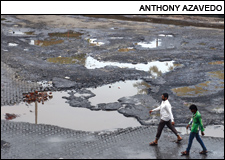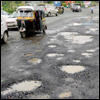 Potholes are a perennial problem in most of the Indian cities. Ideally, a road well constructed or resurfaced with bitumen (black-top) should easily last 5-10 years and a cement concrete road much longer, without requiring any maintenance. However, this has never been the case in India, says Dr. Ashish Verma, President, Transportation Research Group of India.
Potholes are a perennial problem in most of the Indian cities. Ideally, a road well constructed or resurfaced with bitumen (black-top) should easily last 5-10 years and a cement concrete road much longer, without requiring any maintenance. However, this has never been the case in India, says Dr. Ashish Verma, President, Transportation Research Group of India.
This applies particularly to metro cities like Mumbai whose high court recently took matters in its hands. Amid the hue and cry over potholes in Mumbai, the Bombay High Court comprising the division bench of Chief Justice Mohit Shah and Justice M.S. Sanklecha issued notices to the state government and civic bodies questioning the method of awarding contracts for road repairs, especially before monsoon.
The HC asked a number of questions to the civic bodies of Mumbai, Thane and Navi Mumbai, such as whether the civic authorities examined the competence and credentials of the contractors before awarding the contract. The high court repeatedly mentioned about the technology and quality of material as well as inspection by the authorities.
Justice Gautam Patel, a sitting high court judge, highlighted the pathetic condition of roads which resulted in casualties and spinal injuries, especially to riders of two-wheelers. Some accidents were even fatal because of potholes, Patel wrote.
The HC has directed the state chief secretary and principal secretary (PWD); commissioners of BMC, TMC and NMMC; nodal agencies MMRDA and MSRDC, and Mumbai Port Trust to attend the next hearing on August 13. The court also asked the Central Road Research Institute, Delhi, to send a senior official to the hearing. It has been asked to place on record its recommendations on technology and material to be used by the local authorities for constructing and repairing roads.
Commenting on the situation, Dr. B.B. Pandey, Advisor, sponsored Research and Industrial Consultancy, said, “Most of the potholes occur due to ignorance of the engineers and contractors. This has been the feature of most city streets for a long time and it will continue to be so for some more time. There is total absence of quality control at different stages.”
According to the HC, the manner in which civic bodies of Greater Mumbai and Thane award roadwork contracts based on lowest price rather than best technical quality should be stopped. Instead, steps should be taken to examine the competence or credentials in selecting contractors by corporations for checking quality when it comes to the technology and material.
In spite of crores of rupees being sanctioned for road maintenance and over Rs.3,800 crore spent on road reconstruction since 2008, there has been a 700 per cent rise in cost of filling potholes with no improvement in the condition of the roads. About six companies have been bagging these road contracts for over a decade.
The number of potholes reported on the pothole tracking website is a fraction of those on roads. BMC, in its defence, says that the new potholes that appear on city roads with each heavy shower are not the civic body’s only concern—more than 2,300 potholes that BMC claims to have filled since June have already reappeared. That’s more than one-fourth of the 10,000 potholes that the civic body says it has fixed in more than a month.
This once again brings to light the inefficient and shoddy work done by contractors, the brunt of which has to be faced by the citizens. Dr. B.B. Pandey said, “Even for major highways costing over Rs.10 crore per km, knowledgeable engineers are lacking and the roads crack within a year. Government never initiates research to find a solution from different trials.”
Dr. Verma of Transportation Research Group of India noted, “While road construction quality is not difficult to maintain, unfortunately, it is often intentionally ignored to generate more work every year for contractors. The resultant loss due to potholes is not just financial but economic as well.”
While a huge amount of city budget is spent on filling these potholes every year, their recurrence also results in reduction in vehicular speeds causing congestion in the city network, reduced efficiency of traffic control measures like traffic signals, frequent acceleration and deceleration, and use of clutch in vehicles resulting in high fuel consumption and emissions, increase in dust particles and jerks to motorists causing health problems, increase in road accidents, and psychological disturbances to drivers causing road rage.
Government engineers are busy in management of the department and the engineering is left to contractors. “I have myself starved of financial support from the government to solve big problems needed to be solved for the country. Blindly copying foreign recipe does not work in our condition,” Dr. Pandey added.
The main reason is poor quality of construction or resurfacing of road, which gets compounded due to poor roadside drainage for storm water. The continuous contact of road surface with water due to water logging, particularly during rainy seasons, reduces the binding of the aggregates and results in potholes. “A strict and independent quality control check is probably the best way to ensure longevity of our roads and pothole free roads,” Dr. Ashish concluded.
With around half the monsoon over, will the municipal bodies address the root cause of the issue?











